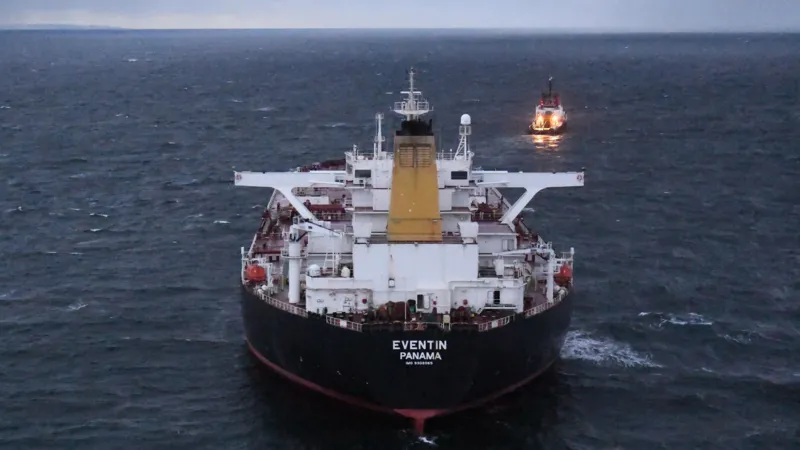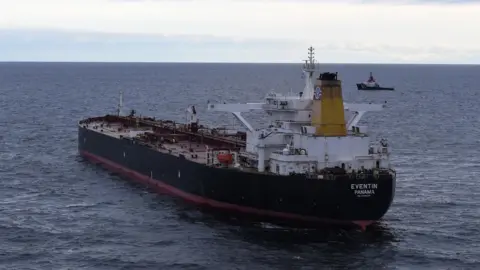Germany says Russian 'shadow' ship stuck in Baltic Sea

German authorities have said an oil tanker stuck in German waters belongs to Russia's "shadow fleet", which Berlin says is used to avoid sanctions.
Germany's maritime authorities (CCME) said on Friday that the Panamanian-flagged ship, known as Eventin, had lost power and steering, meaning tugboats were deployed to secure the vessel.
German Foreign Minister Annalena Baerbock blamed Moscow, accusing Russian President Vladimir Putin of "circumventing" sanctions and threatening European security by "ruthlessly deploying a fleet of rusty tankers".
Russia, which previously declined to respond to accusations that it uses a shadow fleet, has not yet commented on this incident.
The US, UK and the EU have imposed sanctions on Russia's oil industry following Russia's full-scale invasion of Ukraine in 2022.
In its first report of the tanker drifting in German waters, the CCME said the vessel was 274m (898ft) long and 48m (157ft) wide, carrying about 99,000 tonnes of oil.
German maritime authorities said the oil tanker was drifting at a low speed in the coastal waters of the Baltic Sea, north of the German island of Rügen.
A four-person team of specialists was lowered onto the vessel by helicopter on Friday night to establish towing connections, which were secured. Three tugboats took control of the "stricken vessel" that is "unable to manoeuvre".
Maritime authorities said on Friday night that no oil leaks had been detected.
In its latest update on Saturday evening, German maritime authorities said the towing convoy around the tanker was headed to Sassnitz, a town on the island of Rügen, and would arrive early on Sunday.
Earlier, authorities said the convoy of tugboats working to rescue Eventin remained north of Rügen and was moving eastwards "slowly", at about 2.5 km per hour (1.5mph).
CCME said they had taken safety measures given the rough seas, as the area where the vessel is located was experiencing 2.5m-high (8ft) waves and strengthening wind gusts.
 The oil tanker was drifting at a low speed in the coastal waters of the Baltic Sea
The oil tanker was drifting at a low speed in the coastal waters of the Baltic SeaAlthough the vessel sports the Panamanian flag, German authorities have blamed Russia for the incident.
"Russia is endangering our European security not only with its illegal war of aggression against Ukraine, but also with severed cables, displaced border buoys, disinformation campaigns, GPS jammers and, as we have seen, dilapidated oil tankers," the German foreign minister said in a statement.
Last December, the European Union said it was working on measures including sanctions to target "Russia's shadow fleet, which threatens security and the environment, while funding Russia's war budget".
The European bloc's remarks came after undersea cables in the Baltic Sea were damaged by a suspected vessel, which the EU believes was part of Russia's shadow fleet.
The move was a further step taken by Western countries to hit the Kremlin's oil industry in response to Russia's full-scale invasion of Ukraine.
Since tougher embargo measures were put in place to halt Russia from exporting oil, Moscow is believed to be using ships with unclear ownership to transport goods - namely oil - across the globe.
As reported by the Atlantic Council, a US-based think tank, Russia is "instrumentalising the dark fleet, using it especially as a primary conveyor of oil exports".
The shadow fleet, or dark fleet, is the name given to ageing ships that sail "without the industry's standard Western insurance, have opaque ownership, frequently change their names and flag registrations, and generally operate outside maritime regulations", according to the Atlantic Council.
The latest incident in the Baltic Sea comes as Washington and London joined efforts to directly sanction energy companies Gazprom Neft and Surgutneftegas.
UK Foreign Secretary David Lammy said the move to weaken Russian oil companies would "drain Russia's war chest," adding that funds taken "from Putin's hands helps save Ukrainian lives".
But Gazprom Neft slammed the sanctions as "baseless" and "illegitimate", as reported by Russian state news agencies.
Also on Friday, the US Department of the Treasury said it had sanctioned 183 vessels that are "part of the shadow fleet as well as oil tankers owned by Russia-based fleet operators".
Source: BBC
























































